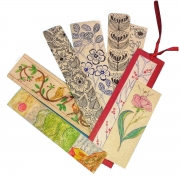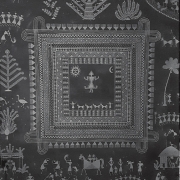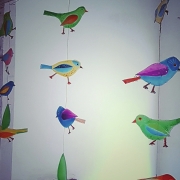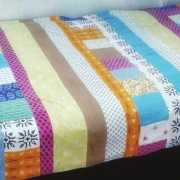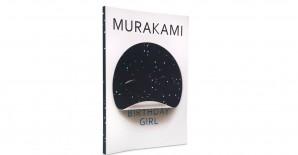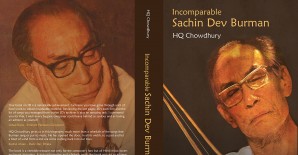
Etcetera
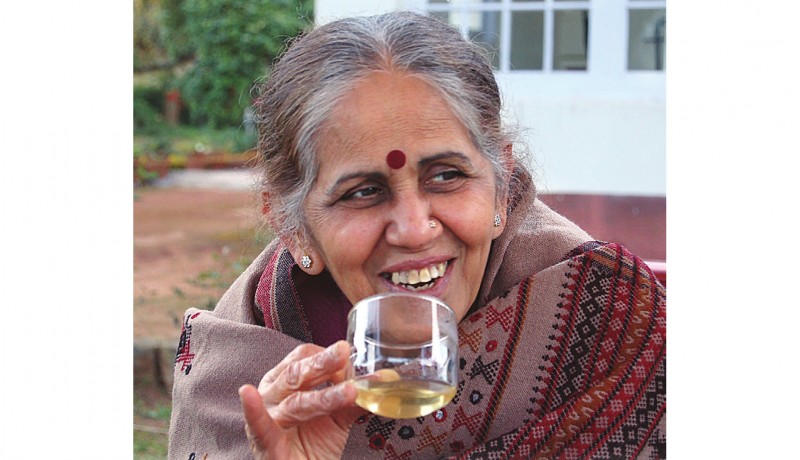
Padmaja Parulkar-Kesnur salutes her mother’s innate, environment-nurturing artistic sensibility
Aai is an ‘artist’ with a capital A. No, she has not sold artwork at boutiques or held exhibitions at art galleries. She has not trained in fine art or seen the insides of an art school. But Madhavi Parulkar has an innate artistic sensibility that enables her to fashion her home and life with an artisanal touch. In a matchbox house, the one of my childhood, wherever you look, you will find some ‘work of art’—functional or purely decorative. Chances are, it would be a new avatar of something that has outlived its original purpose or use. The best part of her creativity is that it is environment-nurturing, where there is minimum generation and maximum recycling of waste. This is not necessarily because she is environment-conscious but because, for her, odds and ends—cloth pieces, broken plates, paper, nuts, bolts, plastic, bottles, you name it—are raw materials.
Simplicity is the hallmark of her creativity. She has always been Spartan in her living, not out of choice, perhaps, but because she was born into a family of modest means. Her creativity was partly fuelled by necessity. As a kid, she designed her own costume jewellery out of flowers and twigs that were abundant and free. Later in life, she stitched her own designer sari blouses from coarse khaddar as she couldn’t afford fancy material or a tailor. Of course, I was fortunate that I had her as my personal fashion designer. One summer when we were to go on a long vacation, she designed an entire ensemble for the teen-me—frocks with frills, skirts with braided pockets, shirt-tops with bows—in a few sittings. Over the years, she collected and stashed bundles of leftover fabric from those tailoring episodes, as resource material. These patches later transformed into bed throws and quilts, a pastiche of my once-upon-a-time ‘hi-fashion wardrobe’.
In her book of life, nothing is a throwaway. Bits of paper discarded during craftwork by grandchildren, gift wraps, shopping bags, newspapers—nothing is spared or not kosher in her eyes. Doodling on theses scraps is one of her favourite pastimes. I have laminated many of her noteworthy pieces and gifted them as bookmarks! A cracked glass bowl gets glossed over with paint and a new lease of life, as table decoration. Attractive liquor bottles get a fill of beetroot wash or some such thing and become accent pieces.
Instead of splurging on easel and acrylics she makes the walls her canvas. Like tribal folk who paint mud walls with kaolin or lime, she makes murals in monochrome. For a month, an entire wall in the living room became a tableau of village life: harvest festival, weddings, religious ceremonies, and everyday activities. The Warli in white is the conversation piece of her humble ‘salon’, which is also her ‘studio’. Aai now has other ‘designs’ on the wall—a Tinga Tinga painting, perhaps—now that the Warli has had faded out of the limelight.
Indeed, in a house where space is at premium, every corner or cranny gets utilised to maximum benefit without overdoing it. There are colourful cloth organisers or compartment hangers for storing stationery and bric-a-brac. One organiser has plastic see-through compartments made from discarded folders and files! Under her gaze, a sturdy mithai box becomes a storage panel for slipping earrings, to be hung by a dressing table. The modest, no-frill bathroom and toilet are spitting clean with just one flower vase—a porcelain pickle jar of yesteryear—with shocking red plastic flowers adorning the window sill. She has a Midas touch and in her hands even cheap paper flowers become kitsch art at its bespoke best. Any wonder then that for designing my brother’s wedding invitations and my visiting card, we looked no further?
Whether it is carpentry or origami, she is good at reverse engineering. If I present her a bird-feeder she will have another put up alongside, handmade with further innovation and artistry. Not for her Internet ideas or Pinterest prompts; her inspiration comes from within her creative reserves. If she has no use for a tablecloth (with mats) someone gifts her, she sews up two mats to make one small-size cushion cover to go with the tablecloth that becomes a cover for the divan. A simple and stunning idea! When a friend was disposing of her Ikea table mats, she cut out the birdies, attached them to strings, and made danglers to run down the niche of a window. With the breeze, the birds gently sway to the background score of sparrows chirping at the bird feeder in the balcony.
Not surprisingly, a person such as her has green fingers too. A tiny cubicle open to the sky is her container garden in which she plants everything from bougainvillea to bonsai from cuttings and saplings obtained from the wild. Buying saplings or fancy pots and planters is anathema to her. The containers, as you must have guessed, are repurposed.
The best part: she has never thought of exploiting her talent for financial gain or expected remuneration for requests she has been flooded with, from friends and family. Instead, she always ends up giving all her artwork as gifts—that’s my Aai.
Photos: Padmaja Parulkar-Kesnur Featured in Harmony — Celebrate Age Magazine March 2018
you may also like to read
-
Cracking the longevity code
Small yet impactful choices can be game-changers, writes Srirekha Pillai At 102, there’s no stopping Chandigarh-based Man Kaur, the world’s….
-
Home, not alone
While a regulatory framework is vital for senior-care facilities, the need of the hour is to develop an ecosystem to….
-
Birthday Girl
Published in a special edition to honour Japanese master storyteller Haruki Murakami’s 70th birthday, Birthday Girl (Penguin; Rs 100; 42….
-
A huge treat for music lovers
Published as the revised and updated second edition, Incomparable Sachin Dev Burman (Blue Pencil; Rs. 599; 470 pages) the authoritative….



